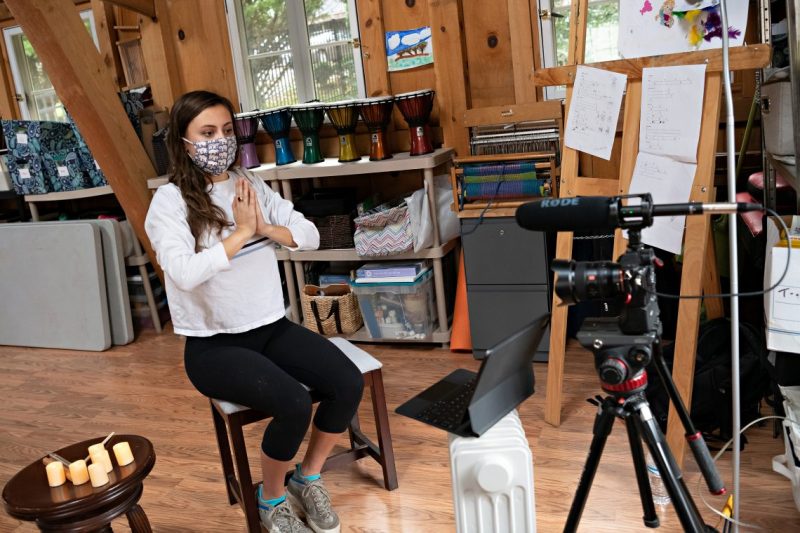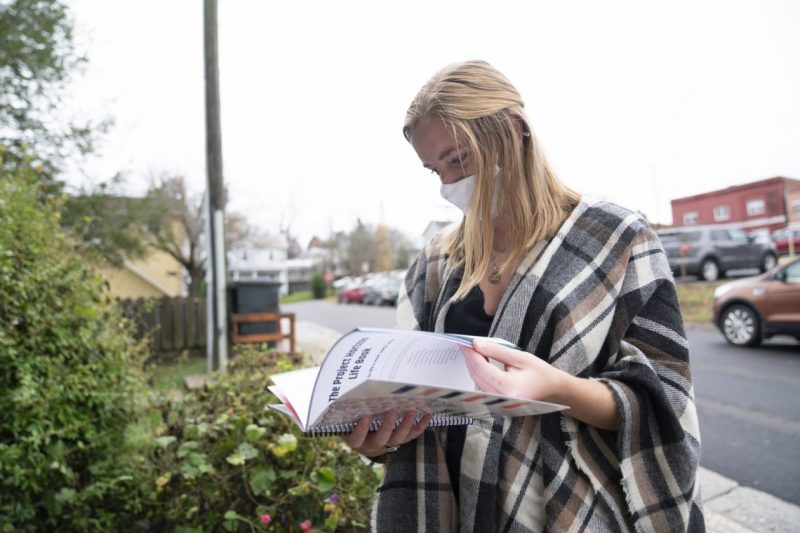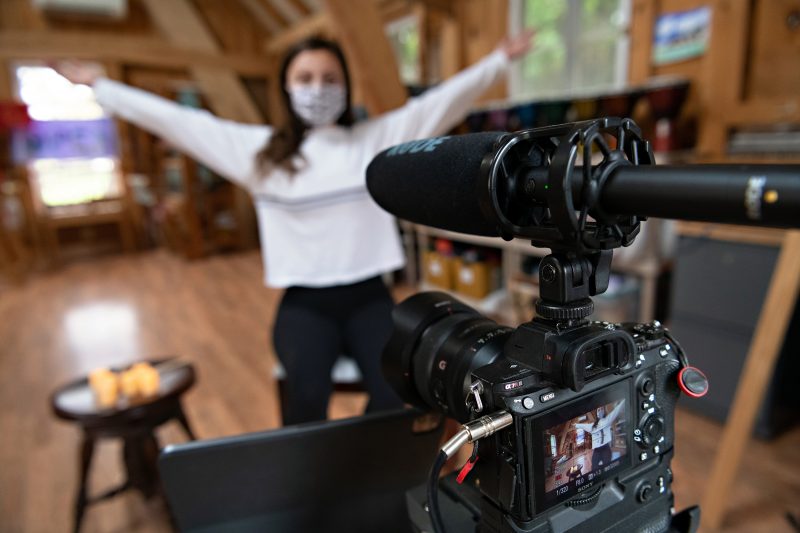Community-Based Learning Thrives Amid COVID-19 The pandemic has presented challenges to working and learning within the community, but virtual and distanced projects have allowed those partnerships to continue to bear fruit this year.
“Innovative projects like these provide new ways of collaborating that could redesign how we think about community engagement going forward.”
~ Sascha Goluboff, director of community-based learning
Community-based learning at Washington and Lee University is all about making connections between the university’s mission and the larger community, so when COVID-19 made physical distancing a necessity, staff, faculty and community partners alike were forced to reimagine what those connections might look like.
In each of the past two academic years, staff in W&L’s Office of Community-Based Learning (CBL) worked with faculty to match some 400 students for credit-bearing work with about 40 nonprofits in Lexington and Rockbridge County. Those partnerships deepen students’ educational experience at W&L and allow organizations to solve problems or advance important projects, all to the ultimate benefit of the entire community.
Heading into Fall Term 2020, faculty such as Karla Murdock wondered how CBL could take place safely. Murdock is a professor of cognitive and behavioral science (CBSC) who teaches a capstone course for CBSC majors that involves community-based learning projects with multiple community partners.
“When it became clear that face-to-face contact wouldn’t be a safe option for my CBL course this term, I knew CBSC capstone students would be very disappointed about losing the chance to work directly with Rockbridge County community members,” Murdock said. “Having said that, our community partners are so creative and inspired that I knew we could collectively pivot so everything could work out.”
Work out it did. Whether they were testing water quality in Hays Creek, inventing educational games for local children or making videos to support the wellness and resilience of community members, W&L students all across campus spent the term doing virtual or distanced projects and giving back to the area they call home.
In a typical year, Murdock’s capstone students would spend about six hours per week in direct on-site service at an agency, but during the pandemic, her students worked with agencies on research or other specific deliverables that could be completed safely.
Lorena Terroba Urruchua ’21 fulfilled her CBSC capstone by writing a training manual for interns at Blue Ridge Autism and Achievement Center (BRAAC), a multi-site agency headquartered in Roanoke. As the longest-standing intern at Lexington’s BRAAC location, having volunteered there since her first year at W&L, it made sense for Terroba to incorporate her experiences into an instructional book for others.
“When I started as an intern, there wasn’t much of a set curriculum that interns have to follow to be trained,” she said. “Every time I came in after a semester, there would be something new that I needed a refresher on.”
Meagan Harding, a behavior analyst and special education teacher at BRAAC, said she and Terroba were able to meet virtually every week to talk about the project as it progressed. She and others at the center are excited to have a supplemental training tool that can be printed and given to interns, as well as updated for future use.
“In some ways, this was a really positive gain from the COVID-19 epidemic because if Lorena were able to be present at the center, maybe her project would have been something different,” Harding said. “I just really appreciate her dedication. It was such a mutually beneficial relationship. It was not just us training her — she wanted to give back.”
Another of Murdock’s capstone students, Meghan Kelley ’21, completed a 12-part video series on wellness for clients at Project Horizon, which serves individuals affected by domestic violence. She had originally planned to teach cycle and fitness classes in person at the nonprofit, but she rethought her plans in light of COVID-19. Instead, she recorded the videos in a small cabin normally used by Project Horizon’s art therapy program.
When she wasn’t recording, Kelley worked remotely to develop scripts and orchestrate logistics for her series. Her lessons used a trauma-informed therapeutic perspective to guide participants through breathing exercises and movements that relieve stress and nurture self-care. She also made a brochure about the series for clients.
“It’s going to be an awesome tool for clients and residents to have,” said Kaitlyn Kaufman, operations and volunteer coordinator for Project Horizon. “It’s something that, if it really takes off, we will likely continue to do.”
In a way, Kelley said, the project turned out better because of the special circumstances, “because rather than being something that will only exist during this capstone experience, now it will live on online.”
Other CBSC capstone projects were conducted at Rockbridge Area Hospice, Blue Ridge Court-Appointed Special Advocates, Rockbridge Area Prevention Coalition, Blue Ridge Area YMCA and Rockbridge Area Relief Association. A silver lining of COVID-19 is that it has created “serendipitous new ways of connecting and inventing,” Murdock said. “With help from W&L’s CBL office, every CBSC capstone student developed a meaningful and timely project that we hope can benefit the community during a difficult moment. I am so grateful for our community partners’ generous mentorship of students who feel deeply invested in serving the Rockbridge area.”
Students in a strategic communication course taught by Professor Dayo Abah also worked with Project Horizon during Fall Term, making a life skills manual for clients there. Read more about that project here.
“Innovative projects like these provide new ways of collaborating that could redesign how we think about community engagement going forward,” said CBL Director Sascha Goluboff.
Associate Professor of Biology Sarah Blythe has relied on CBL for years to complement classroom lessons in her 200-level biology course, Food for Thought, about how humans experience food from a biological, emotional and social perspective. In the past, students have shadowed hospital nutritionists, worked in the community garden and campus kitchen, and assisted Rebecca Wilder, a SNAP-ED Agent at the Rockbridge Cooperative Extension, with after-school programs about healthy eating.
This Fall Term, Blythe’s students collaborated to develop at-home learning experiences for kids in third through fifth grades, building cost-effective take-home kits packed with the supplies necessary for hands-on activities. Working in six groups of three or four, Blythe’s students created 12 separate kits with videos that hammer home messages about healthy eating, such as eating a balanced breakfast or drinking water or milk instead of soda.
For example, one kit featured a lesson about the importance of consuming grains along with a healthy recipe for breakfast pizza on an English muffin. Another kit, titled “Eat the Rainbow,” included a board game based on Candyland that reinforces messages about eating a balanced diet with lots of fruits and vegetables. Blythe said it was rewarding to see the creativity coming out in her students and to give them a chance to practice skills like communication, presentation and video editing.
“I’m really thankful that the CBL office exists and is up and running and trying to get our students these opportunities, even through the pandemic,” Blythe said. “Their responsiveness has been great and the fact that Rebecca Wilder is willing to give so generously of her time is remarkable and really speaks to the strength of community-based learning.”
Director of Sustainability Kim Hodge had her own CBL conundrum leading up to Fall Term as she planned to teach environmental service learning during a pandemic. Some community partners that usually work with her ENV 111 class were understandably hesitant to invite college students into at-risk populations, so Hodge and the CBL office scrambled for alternatives.
Her 12 students ended up working with a variety of partners such as Boxerwood Nature Center, where one student worked on a local carbon-offset program and another researched options for doing a food waste collection program in the community. Two students researched climate action plans for Rockbridge Area Conservation Council, while four worked with RACC to do water monitoring at Natural Bridge and Hays Creek for the Virginia Department of Environmental Quality.
“They’ve been citizen scientists, collecting water quality data in a partnership between RACC and the Alliance for the Chesapeake Bay,” Hodge said.
Other ENV 111 students worked on campus, leading volunteer shifts at W&L’s Campus Kitchen, working with Dining Services chefs, and keeping the campus garden in tip-top shape. “My goal for the class was for them to get hands-on experience in the field so they have a good understanding of what it takes to get a project off the ground,” Hodge said. “I also like for them to get their hands dirty and talk about how it fits into the bigger scheme of things, like food insecurity.”
Faculty in the Shepherd Program also have continued to emphasize community-based learning during the pandemic. Associate Director of the Shepherd Program Marisa Charley teaches a Fall Term course, Fieldwork in Poverty and Human Capability, that usually matches students with community partners for about 20 hours per term, while classroom hours are spent discussing theory and practice. This Fall Term, Charley turned the course into a community-based learning theory course, where students probed the idea of exchanging service or engagement for learning or professional development.
“The thinking they have done this term, in the absence of being involved in that exchange themselves, has really elevated to thinking not about reciprocity of service and learning, but rather the benefits and responsibility of community life,” Charley said, “and that has been remarkable and transformative.”
Charley also invited Leah Gose ’15, a doctoral candidate in sociology at Harvard University, to make a virtual visit to the class and discuss relationships between individuals, institutions and communities, and the dynamics of power in each of those roles. In a final paper, students wrote about redefining the CBL experience.
Faculty members and CBL office staff hope the day will come soon when students are able to visit community partners in person and work side-by-side with them again. Until then, they are grateful for the chance to continue community-based learning from a distance, bolstering relationships that will pay off for the community.
“There is no replacing the coeducation of our community partners,” Charley said. “It is so tremendously valuable, and I really look forward to being able to overlay what we’ve learned about the student experience in this term with the partnership and expertise of our community partners.”
 Meghan Kelley ’21 records a wellness video for Project Horizon clients as part of her cognitive and behavioral science capstone.
Meghan Kelley ’21 records a wellness video for Project Horizon clients as part of her cognitive and behavioral science capstone. AP Smith ’21 gets a first glimpse of the final version of a book she helped create for Project Horizon in a public relations class at W&L.
AP Smith ’21 gets a first glimpse of the final version of a book she helped create for Project Horizon in a public relations class at W&L. Changing her capstone project because of COVID-19 allowed Meghan Kelley ’21 to learn valuable video skills, and it means that Project Horizon clients will be able to watch her wellness lessons in the future.
Changing her capstone project because of COVID-19 allowed Meghan Kelley ’21 to learn valuable video skills, and it means that Project Horizon clients will be able to watch her wellness lessons in the future.
You must be logged in to post a comment.